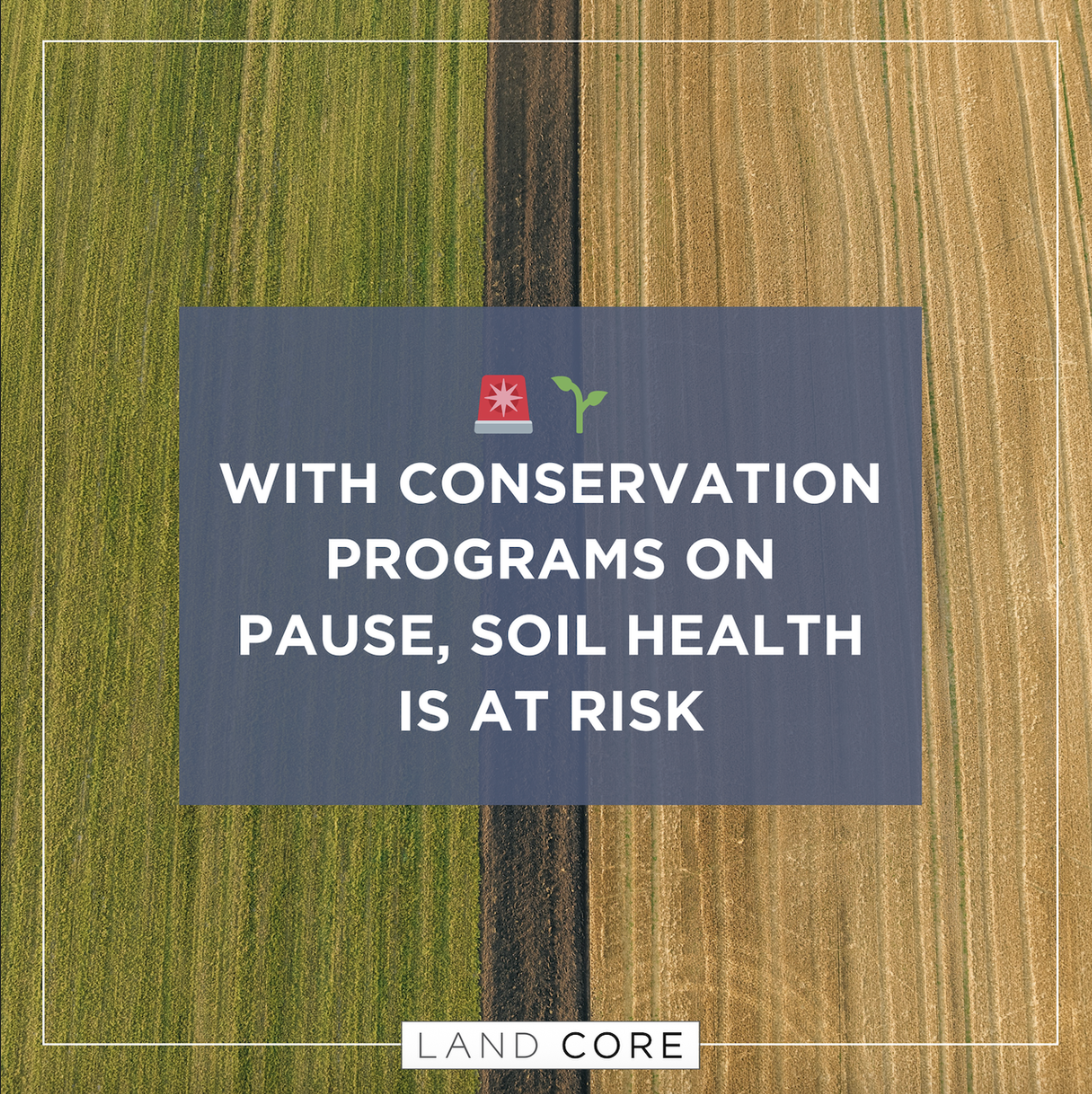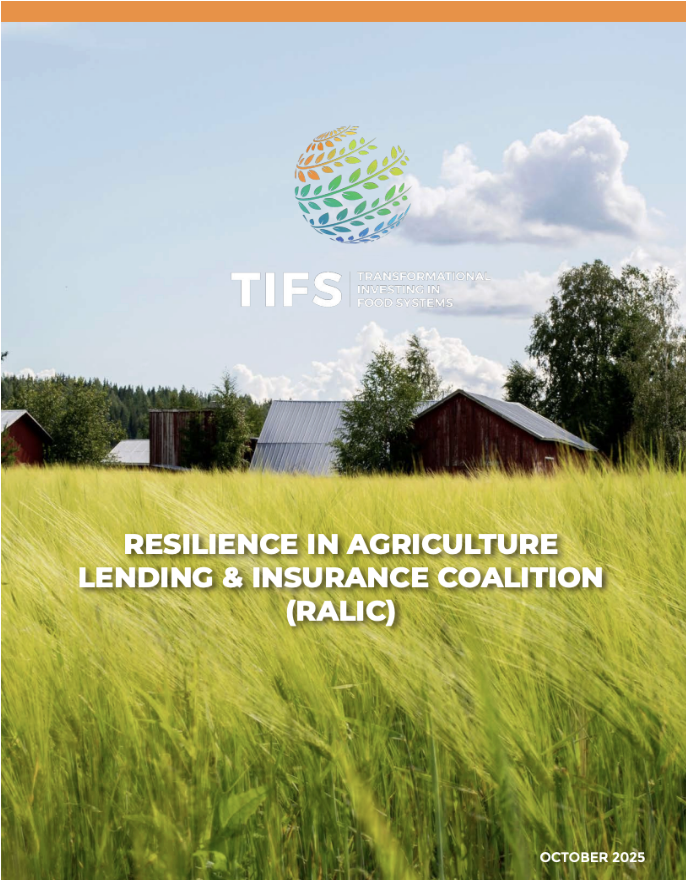Land Core Newsletter - October 2025
Image from Unsplash+
Dear friends and colleagues,
As we move deeper into fall, under the shadow of the government shutdown, the landscape of federal policy is shifting with substantial challenges for American producers. Now into its third week, funding for programs critical to soil health remains on hold.
Meanwhile, federal agencies face additional staffing reductions, and the shutdown continues to deplete resources, making the role of independent organizations and researchers working to advance soil health increasingly critical.
We're reminded that change happens when farmers, researchers, policymakers, and communities work together, and that's precisely what we're committed to doing, regardless of what happens next in Washington.
October 12th was National Farmer’s Day. Especially amid difficult times, we want to highlight and celebrate America’s farmers, thanking them for their absolutely vital contributions to our health, prosperity, and resilience.
Read on for updates on the shutdown's impact, our team's policy work, upcoming events, and what we’ve been reading. There's much to do, and we remain motivated by the unifying power of soil health in these moments of political and social tumult.
Warmly,
The Land Core Team
Support Land Core’s Work
🌱 Donate to Land Core! Building healthy soil is essential to ensuring we can grow healthy, nutrient-rich food here in America. This is more important now than ever before.
As you plan for Giving Tuesday, think of Land Core! Healthy soil sustains thriving farms, resilient farmers, and productive land. Every dollar strengthens our work; pitch in today and keep the momentum going!
Policy Updates
Image from Unsplash+
Government Shutdown + Impact on Soil Health-Related Programs
As the shutdown stretches into its third week, funding for key programs remains halted:
USDA Farm Service Agency offices are closed, leaving farmers without access to technical assistance at a critical pre-harvest time for financing, planning, and paperwork.
While crop insurance remains operational, disaster relief payments and new enrollments in the Environmental Quality Incentives Program (EQIP) as well as the Conservation Reserve Program (CRP) are on hold. NOTE: Critically, CRP funding officially expired at the end of the fiscal year (Sept. 30th), and Congress has yet to reauthorize the program. So far, there is no clear timeline for action on what House and Senate Agriculture Committee leaders have been calling the “unfinished” portion of the Farm Bill. This uncertainty has threatened farmers’ ability to maintain conservation practices, protect soil health, and plan for their next growing season.
Soybean Farmers/Impact of Tariffs
While not directly related to soil health, it is worth noting that American soybean farmers caught amid trade disputes are left wondering if promised bailouts will adequately address the market losses and financial instability that recent tariffs have resulted in. Already facing astronomical input prices and razor-thin profit margins, many fear economic destitution if these bailouts don’t come soon. The administration is reportedly looking at $10-15 billion in potential aid for tariff-impacted commodity farmers, but the shutdown is delaying congressional action needed to push forward this financing.
So, (when/will) there be a ‘Skinny’ Farm Bill?
When the administration’s budget reconciliation package, called the “One Big Beautiful Bill Act” (OBBB), was enacted in July 2025, it absorbed many agricultural programs, leaving stakeholders to wonder whether a pared-down or ‘Skinny’ Farm Bill would follow and address the remaining programs and policy gaps. A 'Skinny' Farm Bill (which has been in the works in Rep. GT Tompson’s office) could reauthorize critical soil health programs: CRP, EQIP, CSP, and RCPP.
As noted above, in addition to the shutdown, we’ve entered a new period of uncertainty with the 2018 Farm Bill funding having expired on September 30th (after having been extended twice). Many of the programs that keep our producers and working lands resilient and productive are now set to expire. While there are still existing funds remaining through the end of the year, without immediate action to re-authorize these programs, producers will lose all access to the support they rely on.
Rooted in Health
Image from Unsplash+
ICYMI: In our September Newsletter and recent Soil Health Analysis on the MAHA Commission’s Strategy Report, we commended the prioritization of soil health as a key policy objective across agencies, including Health and Human Services (HHS), to advance public nutrition.
On October 10th, in response to the current shutdown, HHS announced the firing of over a thousand additional employees deemed "non-essential," following the agency's layoffs of approximately 20,000 staff members earlier this year.
With its workforce severely reduced, concerns related to research and funding initiatives outlined in the MAHA Commission's strategy are being felt, particularly those aimed at advancing soil health, which may now face significant delays or cancellation.
Risk Model Tid Bits
Land Core Co-Founders Aria and Harley contributed to a recent report from Transformational Investing in Food Systems (TIFS), an initiative by the Global Alliance for the Future of Food, to boost investment in regenerative agriculture.
The report, titled “Resilience in Agriculture Lending & Insurance Coalition (RALIC),” outlines an initiative addressing data and insurance gaps that limit adoption of soil health practices.
We are delighted to be able to contribute to the RALIC coalition and to this report, which further expands our work developing market-informed, actuarially sound financial models that reward the risk reduction associated with soil health practices, particularly in the private insurance market. Read their full report here.
Social Highlights
Curious to learn more about the importance of soil health for strong farms, healthy communities, and thriving food systems from Land Core’s Co-Founder, Aria McLauchlan, on stage in New York?
See a clip of her talk on our social channels: Instagram, LinkedIn, Facebook & X or watch the full talk here.
We’re Hiring: Communications Intern!
Land Core is seeking a part-time Communications Intern to support social media, newsletters, and other communications initiatives. This remote role offers hands-on experience in advancing soil health programs and policies, with flexible hours and the opportunity to contribute to Land Core’s mission of supporting farmers, communities, and regenerative land management. More details here.
Bill Tracker Updates
Image from Unsplash+
ICYMI: Land Core recently sent out a Bill Tracker Alert summarizing recent bills related to advancing soil health. Our team was encouraged by the number of nonpartisan soil health bills introduced over the summer and early fall, and remains inspired by soil health’s potential to serve as common ground.
Recent bills include Advancing Research on Agricultural Soil Health Act (S.2582/H.R.4865), CRP Improvement and Flexibility Act (S.2608/H.R.5111), and the Strong Farms, Strong Future Act (H.R.4428), among others. These bills would advance soil health research, expand conservation programs, and provide targeted support to farmers implementing regenerative practices.
Despite this recent progress, we’d be remiss to not acknowledge the impact of the government shutdown on the continued introduction of soil-health-promoting legislation. The shutdown has slowed the legislative process by limiting staff, delaying committee actions, restricting agency input, and stalling funding-related bills, making it harder for soil health and conservation legislation to advance.
Stay up to date by signing up for Bill Tracker Alerts or exploring individual bills on our website.
Upcoming Events
October 21, 2025 – Farmers on the Frontlines: Policy, Pesticides, & the Future of Regeneration
Hear from Land Core’s Co-Founder Aria McLauchlan at this upcoming Soil & Climate Alliance (SCA) virtual policy webinar, where panelists will explore recent legislation (from HR 1 to a potential ‘Skinny’ Farm Bill), examine federal and state support for farmers, and highlight current agriculture priorities to inspire collective action toward a regenerative transition. Register for the free webinar here.
November 9-12, 2025 – Canvas 2025: Where Crop, Agronomic, Environmental, and Soil Sciences Connect (Salt Lake City, UT)
Formerly known as the ASA/CSSA/SSSA International Annual Meeting, this conference brings together crop, agronomic, environmental, and soil science experts to share thousands of abstracts, keynote/plenary talks, workshops, field tours, student programs, and exhibitor showcases — all to foster innovation, networking, and scientific advancement. More info here.
What We're Reading
Trump promised farmers a bailout. Time is running out.
President Trump promised farmers a multibillion-dollar bailout to offset tariffs and rising costs, but delays in finalizing funding and deployment mean payments could take months even if the shutdown ends quickly. With planting season approaching, farmers need commitments within weeks or risk a crisis.
By Myah Ward and Grace Yarrow, Politico, October 16, 2025
Some Farmers Are Increasing Cover Crop Acres to Cut Fertilizer Costs and Boost Soil Health
Many U.S. farmers are increasing cover crop plantings this fall to improve soil health and recycle nutrients, which can reduce the need for synthetic fertilizers for next year’s corn and soybean crops.
By Rhonda Brooks, AgWeb, October 14, 2025
Weight-loss drugs and MAHA are hammering US sugar beet farmers
U.S. sugar beet farmers are facing a sharp decline in prices (down 33% from last year) driven by reduced domestic consumption, competition from imports, inflation, and the rising use of GLP-1 weight-loss drugs. As a result, many growers are relying heavily on crop insurance and government aid to cover costs, while some processing plants are closing and farmers struggle to break even.
By Karl Plume, Reuters, October 8, 2025
This Federal Food and Agriculture Work Will Cease During the Shutdown
The federal government shutdown has forced USDA, FDA, and EPA agencies to furlough thousands of staff, pausing most farm support, conservation, and food safety programs while leaving only essential operations running. Farmers face halted payments, limited technical assistance, and slowed inspections, threatening both agricultural operations and food system oversight.
By Lisa Held and Rebekah Alvey, Civil Eats, October 1, 2025
Agricultural practices can threaten soil resilience through changing feedback loops
This new study uses a systems-thinking approach to examine how conventional agricultural practices, such as tillage and fertilizer use, impact soil resilience, finding that repeated management can degrade soil structure, organic matter, and biodiversity over time.
By Alison M. Carswell and others, NPJ Sustainable Agriculture, October 1, 2025
A decade-long field study found that sustained biochar application improved soil properties, restructured microbial communities by promoting beneficial taxa and suppressing pathogens, and optimized rhizosphere metabolites linked to plant defense and nutrient pathways. These soil and microbial enhancements translated into better soybean growth, including increased root development, biomass, and yield.
By Di Wu and others, Biochar, August 25, 2025







